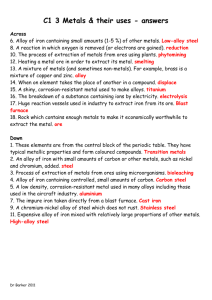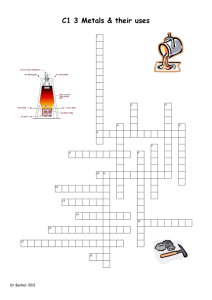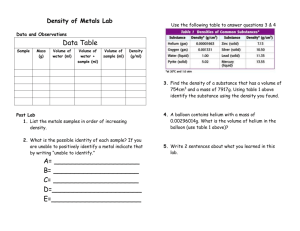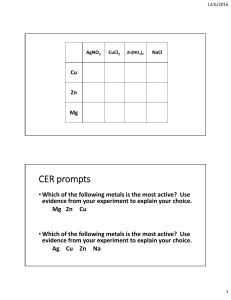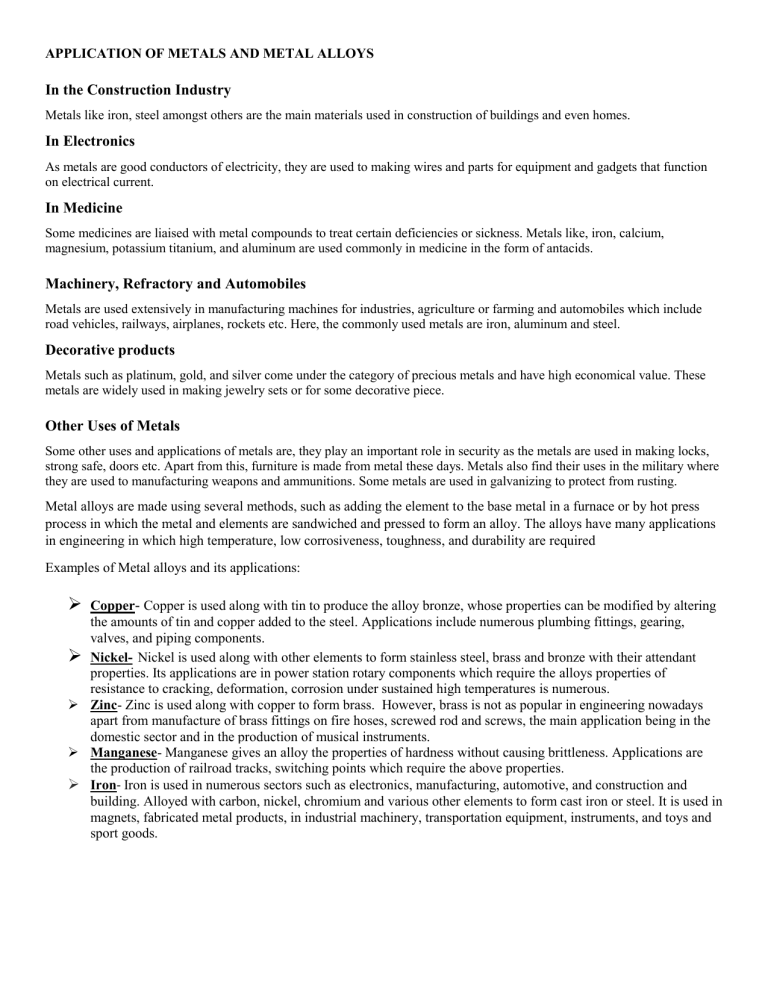
APPLICATION OF METALS AND METAL ALLOYS In the Construction Industry Metals like iron, steel amongst others are the main materials used in construction of buildings and even homes. In Electronics As metals are good conductors of electricity, they are used to making wires and parts for equipment and gadgets that function on electrical current. In Medicine Some medicines are liaised with metal compounds to treat certain deficiencies or sickness. Metals like, iron, calcium, magnesium, potassium titanium, and aluminum are used commonly in medicine in the form of antacids. Machinery, Refractory and Automobiles Metals are used extensively in manufacturing machines for industries, agriculture or farming and automobiles which include road vehicles, railways, airplanes, rockets etc. Here, the commonly used metals are iron, aluminum and steel. Decorative products Metals such as platinum, gold, and silver come under the category of precious metals and have high economical value. These metals are widely used in making jewelry sets or for some decorative piece. Other Uses of Metals Some other uses and applications of metals are, they play an important role in security as the metals are used in making locks, strong safe, doors etc. Apart from this, furniture is made from metal these days. Metals also find their uses in the military where they are used to manufacturing weapons and ammunitions. Some metals are used in galvanizing to protect from rusting. Metal alloys are made using several methods, such as adding the element to the base metal in a furnace or by hot press process in which the metal and elements are sandwiched and pressed to form an alloy. The alloys have many applications in engineering in which high temperature, low corrosiveness, toughness, and durability are required Examples of Metal alloys and its applications: Copper- Copper is used along with tin to produce the alloy bronze, whose properties can be modified by altering the amounts of tin and copper added to the steel. Applications include numerous plumbing fittings, gearing, valves, and piping components. Nickel- Nickel is used along with other elements to form stainless steel, brass and bronze with their attendant properties. Its applications are in power station rotary components which require the alloys properties of resistance to cracking, deformation, corrosion under sustained high temperatures is numerous. Zinc- Zinc is used along with copper to form brass. However, brass is not as popular in engineering nowadays apart from manufacture of brass fittings on fire hoses, screwed rod and screws, the main application being in the domestic sector and in the production of musical instruments. Manganese- Manganese gives an alloy the properties of hardness without causing brittleness. Applications are the production of railroad tracks, switching points which require the above properties. Iron- Iron is used in numerous sectors such as electronics, manufacturing, automotive, and construction and building. Alloyed with carbon, nickel, chromium and various other elements to form cast iron or steel. It is used in magnets, fabricated metal products, in industrial machinery, transportation equipment, instruments, and toys and sport goods. Aluminum- is used in industrial machinery for its non-pyrophobic properties, its resistance to corrosion and high strength to weight ratio. Examples: Power Lines Window Frames 1. Power lines 2. Window frames 3. High-rise buildings 4. Consumer electronics 5. Household and industrial appliances 6. Aircraft components 7. Spacecraft components 8. Ships 9. Trains 10. Personal vehicles Beryllium- is a hard and light metal that has a high melting point and unique nuclear properties, which make it vital to numerous aerospace and military applications. Examples: 1. Consumer electronics and telecommunications Electrical contacts High-definition televisions Connectors in cell phones and computers 2. Industrial components and commercial aerospace 3. Defense and military (rocket nozzles) 4. Medical (making radiation windows for X-ray tubes) Bismuth- is a brittle metal, so it is usually mixed with other metals to make it useful. It is used in extinguishers, electric fuses, and fire detectors. Certain bismuth compounds are also manufactured and used as pharmaceuticals. Industry makes use of bismuth compounds as catalysts in manufacturing acrylonitrile, the starting material for synthetic fibers and rubbers. It is occasionally used in the production of shot and shotguns. Chromium- has found a wide range of applications due to its hardness and resistance to corrosion. It is mainly used in three industries ― metallurgical, chemical, and refractory. It is widely used for manufacturing stainless steel, as it prevents corrosion and discoloration of steel. Today, it is a very important alloying material for steel. It is also used for manufacturing nichrome that is used in resistance heating elements due to its ability to withstand high temperatures. Cobalt- has been used in many industrial, commercial, and military applications for ex. Cobalt-based superalloys form high-temperature resistant parts for gas turbine aircraft engines, space vehicles, rocket motors, and other aerospace applications. Other examples of metal alloys are Gallium, Gold, Indium, Lead, Magnesium, Mercury, Plutonium, Potassium, Rare earths, Rhodium, Samarium, Silver, Titanium, Tin, and Uranium.

